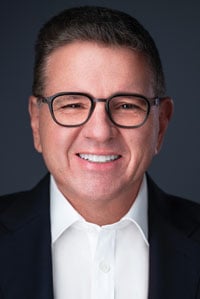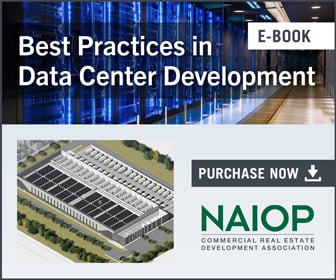The president of Altman Logistics Properties, headquartered in Fort Lauderdale, Florida, shares his insights on the importance of people skills, servant leadership and the dynamic logistics industry.
Development: You have worked in senior leadership positions at Prologis, Opus and HRP Group. What drew you to a career in logistics real estate?

Mark Levy
Mark Levy: While interning one summer during college, I worked for a prominent attorney, Bob Fiebach, at Wolf, Block, Schorr and Solis-Cohen in Philadelphia. I found the work interesting but saw myself as much more business-minded. Bob encouraged me to connect with one of his clients, a large multifamily property owner in Philadelphia.
I reached out, and Philadelphia Management offered me an internship the next summer. My role there was less than glamorous. I was responsible for accounts receivable for a portfolio of residential rental communities with “payment reluctant” tenants. This was 1990, so my job literally was to knock on doors and request overdue rent payments. Many tenants were not thrilled to see me, but that experience was foundational. Many people had real-world life problems, and the essence of the job was to identify solutions where we could get paid, emphasizing a willingness to work with individuals to achieve desired outcomes on a very granular level.
It taught me that interpersonal skills and organic problem-solving in the field are the backbone of the business. I took that lesson to heart. My ability to connect with people and build relationships, plus a willingness to seek good mentorship, is vitally important. We are a people and process business, guided by a mission to deliver the best results for all stakeholders involved.
During this time, I was also an intern at WMMR 93.3’s “Morning Zoo” with the legendary John DeBella. Morning radio is very much like commercial real estate — constantly changing, ultracompetitive and requiring constant adaptability.
Development: For those who aren’t familiar, please talk about Altman Logistics Properties.
Levy: We recently rebranded from BBX Logistics Properties to Altman Logistics Properties to better align with the broader brand of the Altman Companies, which has a long history in real estate development. The change reflects our evolution and growing focus on logistics real estate. Altman Logistics Properties specializes in developing and acquiring best-in-class logistics assets in key markets across the Eastern United States. We focus on high-growth, supply-constrained locations where demand for modern logistics facilities is strong and significant barriers to entry exist.
Development: As the head of Altman Logistics, what does your role entail?
Levy: My role primarily falls into two key areas. First, I am responsible for the company’s strategic vision and managing our capital partner relationships. Second, I focus on building the foundation for long-term success. A major part of my role is mentoring and developing our talent through what I call servant leadership — helping our team members achieve both their professional and personal goals.
Development: Could you elaborate on what servant leadership means?
Levy: I follow a set of core principles that guide my approach to leadership. These aren’t just abstract ideas — they’re values I actively work to implement daily. These include:
- Clear vision: First and foremost, a great leader must have a clear vision and communicate it effectively. People need to know where the company is headed, why it matters and how their roles contribute to that vision.
- Integrity: Trust and honesty are nonnegotiable in leadership. Without them, you can’t build strong teams or lasting business relationships.
- Empathy: Strong leaders genuinely care about the well-being of their team — understanding their concerns, recognizing their contributions and supporting their growth. Leadership is about people first.
- Communication: Whether it’s setting expectations, providing feedback or rallying the team around a goal, clear and transparent communication is critical.
- Adaptability: The ability to pivot and adjust to changing circumstances is crucial in an industry as dynamic as real estate.
- Decisiveness: Leaders need to make tough calls quickly and confidently, even when they don’t have all the facts. Hesitation can lead to missed opportunities.
- Delegation: I emphasize delegation, emotional intelligence, inspiration, accountability and collaboration. A leader’s job isn’t just to direct — it’s to empower their team, foster a culture of ownership and build an environment where people thrive.
Leadership is about serving others and setting them up for success. If my team is growing, achieving their goals and making meaningful contributions, then I know I’m doing my job as a leader.
Development: What has been your greatest leadership challenge?
Levy: Developing a strong pipeline of deal flow while simultaneously building a team and a logistics real estate company from the ground up. When I started, it was essentially just me working to establish the business. This was a true startup that had the unusual benefit of a larger organization’s infrastructure and support.
Development: As your company grows, how do you handle conflicts or mistakes when they arise?
Levy: Conflict and mistakes are inevitable, but how you handle them defines your leadership. I take a structured approach that includes addressing the issue quickly; staying calm and objective; listening to all parties involved; focusing on solutions, not blame; analyzing the root cause; encouraging open communication; offering support and guidance; promoting accountability; implementing necessary changes quickly; and leading by example. Each of these steps plays a role in ensuring that conflicts or mistakes don’t derail progress and instead become opportunities for growth, learning and better decision-making.
Development: What do you look for when hiring senior staff?
Levy: There are three core qualities. First, intellectual curiosity is critical. Second, empathy and high emotional intelligence are especially important because we operate in a complex business where negotiations often involve intricate agreements and multiple stakeholders. Third, a strong desire to win — but as a team player. Success in this business isn’t just about individual achievement; it’s about collective success.
Development: As a logistics developer, are you concerned about the new tariffs being discussed in Washington?
Levy: The tariffs present both challenges and opportunities for the logistics sector. Two of our markets — South Florida and New Jersey — are heavily tied to port activity. That means any changes in trade policy directly impact our customers and, by extension, our business. One major concern is the potential increase in transportation and supply chain costs. Tariffs will increase the cost of transporting goods between affected countries, leading to adjustments in global transportation routes as companies redirect shipments through various countries to avoid high tariffs, thereby complicating and making supply chains less predictable.
Another challenge is the uncertainty tariffs create, both in terms of their magnitude and duration. The worst thing we can have in any business climate is a lack of certainty or direction.
That said, there are also opportunities. Tariffs could accelerate nearshoring and supplier diversification, reducing reliance on heavily taxed regions and bringing more manufacturing and distribution operations closer to the U.S. Events often create changes to infrastructure, which at the end is for the better — a lesson learned during the pandemic.
Development: What do you see as the greatest challenge for Altman Logistics Properties going forward?
Levy: Beyond the likely short-term challenges posed by tariffs, land constraints in high-demand markets are becoming increasingly pronounced. Infill locations are highly competitive to acquire, making suitable industrial sites increasingly scarce. Additionally, development costs continue to rise due to environmental factors, design requirements and entitlement costs. Another issue is the uncertainty in capital markets. Interest rates, financing conditions and investor sentiment can change rapidly, influencing how projects are funded and the returns that can be achieved. Institutional capital remains strong in logistics real estate, but we must stay disciplined and ensure our projects can perform through market cycles. Finally, shifting tenant demands are transforming logistics real estate. The rise of e-commerce, automation and sustainability requirements means modern warehouses need to be more technologically advanced and energy-efficient.
Development: What is the best advice you’ve received in your 25 years in the business?
Levy: Early in my career, I received five key pieces of advice that I still follow today: Build and nurture relationships. Don’t fear market cycles — learn to adapt to them. Listen more than you speak — something my father, who was a trial judge, always told me. Focus on fundamentals, not speculation. And, finally, always do the right thing, even when no one is watching, which is another lesson from my father.
Development: What advice would you give to someone new to commercial real estate?
Levy: My advice for anyone starting in commercial real estate is to focus on mastering the fundamentals. The more you understand every aspect of the business, from deal structuring to market dynamics to leasing and development, the better positioned you’ll be for long-term success. Beyond that, I’d emphasize a few key principles: Build a strong network, be patient and persistent, leverage technology, develop strong communication skills, work hard and be resilient.
Development: You’ve been very active in NAIOP. How has that helped you in your career?
Levy: NAIOP has been a tremendous part of my success. The organization has provided invaluable networking opportunities, helping me build strong, lasting relationships with industry leaders. Beyond that, NAIOP offers best-in-class industry insights and education, which have been incredibly beneficial in staying ahead of market trends. The organization’s advocacy efforts also ensure that commercial real estate professionals have a voice in shaping policies that impact
our industry.
One of the most valuable aspects for me has been access to top-tier market data and research. As a NAIOP Research Foundation Governor, I’ve found the depth and timeliness of the market insights incredibly relevant and useful in my work. Lastly, NAIOP has provided leadership and career development opportunities that have helped me grow both professionally and personally. I’m grateful for the role the organization has played in my career.
Development: What do you enjoy doing in your free time?
Levy: I love to travel extensively, particularly throughout Latin America. One of my favorite things to do when traveling is to take architectural tours. I’m often considered the “nerd” on vacation because I enjoy immersing myself in opportunities to learn. I love spending time by the ocean, but I also enjoy exploring urban environments. Beyond that, I’m a collector of vintage watches and have a passion for Eames furniture from the 1940s and 1950s.
Ron Derven is a contributing editor to Development magazine.






